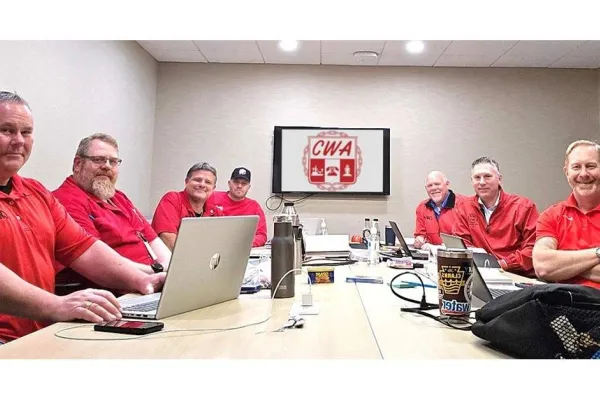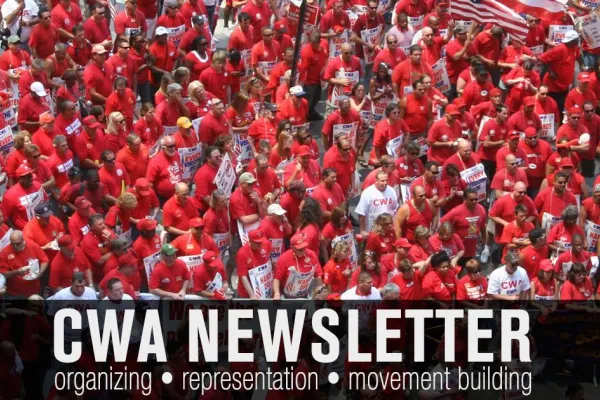Verizon strike has bigger lesson for U.S. Economy by President Larry Cohen
Dear Sisters and Brothers,
While in many previous years, these weeks in August would be quiet, they are anything but that this year. Forty-five thousand strikers at Verizon have been a wake up call to our entire movement. The largest strike in more than a decade and at a time when the voice of workers is nearly silent. In addition, last Saturday in Columbus, thousands of CWAers led Stand Up Ohio in a festival that not only galvanized volunteers for the November referendum election to restore bargaining rights but also provided a glimpse of the progressive culture that binds us together in so many ways. But the list is much longer: Wisconsin recall elections, bargaining for 40,000 New Jersey state workers, our enormous organizing drives for 10,000 customer service staff at American Airlines, T-Mobile techs, customer service and retail workers organizing, other major bargaining across all sectors, August Accountability work on National Mediation Board, organizing rights and Medicare.
So it's all about movement building--putting the pieces together that link our work together and creating visibility, high energy and emotions. Pasted below is an op-ed I wrote that was posted yesterday in a beltway journal--The Hill--would appreciate your feedback as we build our movement together!
In Solidarity,
Larry
Verizon strike has bigger lessons for U.S. economy
The 45,000 CWA and IBEW members are hopeful that Monday night's return to work at Verizon after a two- week strike will bringmeaningful collective bargaining and a good result for all concerned. For us, the strike was about real collective bargaining rights as much as about preserving the standard of living for our families.
The unity of our members and the widespread public support for workers really speak to the general state of working families in the US. This includes stagnating real wages in recent years, the collapse of employer based health care, declining retirement security and the export of good jobs to low wage contractors and offshore. The root cause of much of this decline is the collapse of bargaining rights in the US in both the public and private sectors.
For our members and their union, as well as Verizon management, at least on the surface, there is no larger story. The strike was about this contract and the state of bargaining at this company. Verizon has begun a management transition, and we are hopeful that for lots of reasons this is an opportunity for change. But the unity of our members and the popular support of their cause, to a large extent, reflects how normal cuts have become and how unusual resistance on this scale is in the United States of the 21st century.
For working women and men, and retirees in the US, there is little structural economic support. We can pretend otherwise, but look at nearly every other industrial democracy, where high level and cost effective health care is the norm, retirement security means much higher income replacement, public policy supports retaining jobs in key industries and most important, there is widespread public and politicalsupport for collective bargaining.
We are in an economic free fall. Pretending that we are consumers and not working Americans first will not fix it. Tax cuts will not fix it. Attacks on working Americans and their rights like those led by Republicans in the House of Representatives and extremist governors at every opportunity will make the landing even harder.
We need to restore workers' rights in a meaningful way so that we all can negotiate and engage our employers in a meaningful way. Human resource leaders at major US based employers should be ashamed of looking to cut costs at every turn, then collaborating with multi-billion dollar political machines to fight every political attempt to restore balance through publicpolicy. For example, nearly without exception, US management opposed federal legislation mandating that all employers pay for quality care. Even those employers like Verizon that provide decent health care end up subsidizing employers that are health care deadbeats by ensuring spouses who work for those companies.
Collective bargaining can make a difference. Look back to 1938, when the United States still was gripped by the last of the recessions that made up the Great Depression. Well known economist John Maynard Keynes wrote to President Franklin D Roosevelt, stating that the jobs program and financial regulation were important, but "I regard the expansion of collective bargaining as essential."
Keynes was not particularly a union supporter but he understood, as did economists for decades to come, that collective bargaining is a critical engine to fire up the demand curve and enable workers to improve their conditions in discussion with management, thus improving the economy. We will never have an economic recovery in this country if instead very profitable employers automatically cut wages, cut benefits and ship more good jobs overseas because their colleagues at other firms are all doing it. That remains a race to the bottom.
We can't have a recovery based on a "dollar store" economy. Unless workers can truly use bargaining rights to better their conditions, that's exactly where we're headed. The strike at Verizon demonstrates the severity of the problem, but it will take a majority based political movement to fix it.
Larry Cohen is president of the Communications Workers of America, which represents 700,000 working men and women in communications, media, airlines, manufacturing, health care and public service.
CWA and Labor Allies Win Political Victories Across Texas



